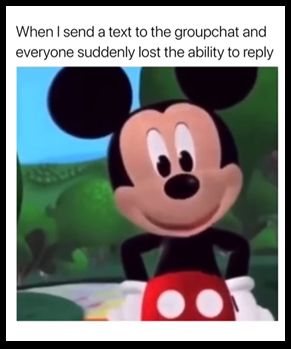Friends
How a Friend Group's Texting Can Turn Toxic
It it time to exit the group chat?
Posted March 31, 2024 Reviewed by Ray Parker
Key points
- Friends ignoring our messages in group chats can foster feelings of loneliness and neglect.
- Confronting neglect requires a balancing act.
- Thus, a mask of friendliness becomes necessary for ingroup behavior and staving off social isolation.
- Voicing concerns could mean leaving the group but keeping one's authenticity, dignity, and self-worth.
Recently, I came upon a meme that exemplified perhaps the darker part of group friendships: exclusion. The meme, which I'll detail below, highlights that while friendships and group bonds can offer us a sense of belonging through shared values and interests, they can also devolve into something deeper, fostering instead feelings of loneliness and neglect.
For readers who rarely peruse social media, a meme is defined by SaintHoax, a leading Instagrammer, as "a piece of media that is repurposed to deliver a cultural, social or political expression, mainly through humor."
The main text of the meme reads, "When I send a text to the group chat, and everyone suddenly lost the ability to reply." This gives context to a video of a satirical Mickey Mouse saying, "Well, I'm waiting for your response. Are you just not going to say anything?" with a few aggressive expletives thrown in for true effect.

The meme showcases the inner aggression—despite an outward friendly appearance—that comes from feeling the pain of having no one in a friendship group chat respond. The video showcases the conflicting internal feelings and external behavior resulting from neglect despite the veneer of belonging: Wearing a mask of friendliness, a necessity for ingroup behavior, while inwardly feeling the annoyance and frustration that comes from perceived rejection.
The comments from viewers on the meme predominantly focused on themes of exclusion, like being left out of a group chat. Some, albeit few, comments encouraged leaving the group if friends don't reply: "That's when you leave the 'gc' [group chat]," one comment reads.
Indeed, friendship groups are complicated, and feeling neglected, as shown both in memes and comments, can certainly be a common experience.
If friendship groups, in theory, stave off loneliness, why might we feel neglected instead?
As I write about here, in friendships of just two people, closeness is clear, and conflicts are easier to manage. But as a third person is added and a group forms, complexity increases, thus multiplying the dynamics of closeness within direct and indirect relationships and making it harder to gauge if we're valued and if we value the friendships in return. Each additional person added to the group further complicates this and might cause the creation of sub-groups, further changing how individuals interact by the way group dynamics form.
Part of the creation of these dynamics includes a more dominant personality within the group becoming the self-selected "leader." which may cause others to mimic the leader or alter their own behavior in ways that would not be seen in two-person friendships. Or, the group might have two dominant personalities who frequently "battle" in subtle ways to gain control of or influence the group over the other, causing individuals within the group to either take sides, or wait to react. In any case, as per Tajfel and Turner's social identity theory, the groups we choose to affiliate with can form a crucial part of our self-concept, and in being part of a group, people adopt the group's characteristics, including its norms, values, goals, and behaviors.
The meme above encapsulates the complexities of group dynamics and the frustrations and turmoil that can accompany it: Despite experiencing discontent with friends, keeping a smile and friendly external demeanor, just like Mickey Mouse, allows one to conform to the unspoken expectations of the group, thus forgoing social isolation. While this may differ greatly from an internal dialogue of aggression resultant from internal feelings of neglect, not voicing discontent means potentially being inauthentic to oneself, which can lessen one's self-worth, particularly if we value having our needs met. But, voicing the discontent means having to have difficult conversations within the group and risking group dynamics of a leader choosing to ostracize the complainant, and having other friends follow.
While only a few comments called for "exiting the group chat," balancing our need for connection in awaiting replies that may never come with seeking authentic conversations and fulfillment within friendships is a difficult and personal choice. Choosing to exit the group chat is a brave response in choosing to meet one's individual needs over belonging needs, but only you can determine if it's the best decision for you.
Facebook image: evrymmnt/Shutterstock
References
Rogers, K. (2022, January 26). What is a meme? The New York Times. https://www.nytimes.com/2022/01/26/crosswords/what-is-a-meme.html


